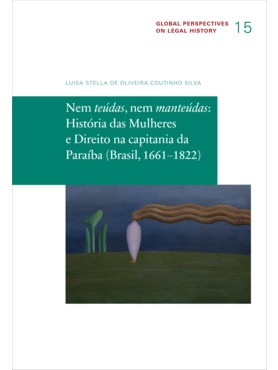
In her Portuguese-language monograph, Nem teúdas, nem manteúdas: História das Mulheres e Direito na capitania da Paraíba, Luisa Stella de Oliveira Coutinho Silva presents a legal history of women in colonial Paraíba, a captaincy located on the northeast coast of Brazil. The study draws on traditional legal sources and other normative traditions for the period from the end of the Dutch occupation (1661) to Brazilian independence in 1822; furthermore, dozens of cases from Portuguese and Brazilian archives are analysed.
The book focuses on the daily life situations of women in relation to both secular and religious jurisdictions. The issues touched upon include marriage and other family formations, single parenthood, different experiences of motherhood (eg in cases of rape), widowhood, bigamy, adultery and divorce. The legal and normative experiences of married women are also compared with those of women living in monasteries, houses of retreat (recolhimentos) or prisons, and with those of prostitutes. In addition, the book examines questions of women’s ownership of goods and land, and whether belonging to a particular religion influenced their room for manoeuvre in normative contexts.
This analysis vividly demonstrates that law on the ground was dynamic and that the interplay of multiple normativities offered women various possibilities depending on their condition, status, religion and sexual options / sexuality. This study of legal practices in colonial Paraíba thus challenges the immutability of sex and gender categories, stressing instead how flexible these categories could be.
An open access copy of the book is available and can be read here
About the author
Luisa Stella de Oliveira Coutinho Silva is a researcher at the Max Planck
Institute for Legal History and Legal Theory in Frankfurt am Main, Germany. She is qualified to practice law in Portugal and Brazil. She studied law and psychology in Brazil and holds a MSc and PhD in Legal History from the Universidade de Lisboa. Her research focuses on women’s legal history and the Portuguese Empire in the early modern period. She has recently published a chapter entitled “Women in the Captaincy of Paraíba: a Legal History Approach to the Sources of Colonial Brazil” in Fundamental Questions: Gender Dimensions in Max Planck Research Projects edited by Ulla Weber and published by Nomos. This chapter is open access and it explores some of the themes mentioned above in the English language. It can be read here









